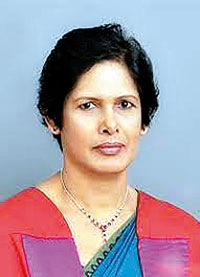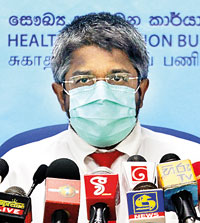News
‘When balancing lives and livelihoods, don’t get COVID-19 and don’t give it to others’
With the high possibility of COVID-19 being around for a long while, the President of the Sri Lanka Medical Association (SLMA), Dr. Padma Gunaratne looks forward and backward.
“Let’s vaccinate, through our efficient state hospitals, all those who attend the regular clinics to give coverage to vulnerable people with co-morbidities such as diabetes and cardiovascular and kidney disease, the SLMA has recommended to the Health Ministry,” said Dr. Gunaratne at an interview with the Sunday Times on Friday.

Dr. Padma Gunaratne
She said that there are vaccines like AstraZeneca that give a significant amount of immunity following a single dose. Then this group would not fall through the system as they and the elderly (a majority of whom are also living with co-morbidities) would get protection. They are the people at high risk of catching COVID-19 and also dying of it, as the death toll indicates.
The SLMA has also suggested the strengthening and further expansion of home-based care for asymptomatic people who are not in the high risk categories.
Looking back, Dr. Gunaratne says that the third wave commenced around the time of the New Year and reported case numbers rose close to 3,000 daily. Around May 20, severe travel restrictions were implemented. As the epidemiology of the infection has clearly shown, it took about another three weeks for some decline in cases.
“Even between the second and the third wave, we had a small number of cases. We never touched zero. We reduced the numbers through travel restrictions but people did not follow the restrictions 100%. There was some improvement but we may have had a better reduction if we adhered more strictly to the restrictions,” she said.
Dr. Gunaratne explained that the country needed a reduction in case numbers to give a breathing space for overloaded and burdened hospitals to cope and make ready for future needs. Earlier, positive people in the third wave were awaiting admission to hospital and home deaths were increasing. The reduction in cases also allowed the opening out of the country to some extent and gave time for the vaccination programme to be effective. However, with the infection being spread from human to human by a virus, public health precautions are critical.
“In this matter of balancing ‘lives with livelihoods’ which could lead to an invariable rise in infection numbers, the SLMA urges the people to take all precautions. Ensure that you don’t get infected and that you don’t infect anyone else,” she said.
Applauding the authorities over the fact that Sri Lanka has almost every effective vaccine and the rollout is happening smoothly (bigger numbers at a faster rate) after the initial issues were ironed out, Dr. Gunaratne said that people need to understand that to develop immunity it takes about two weeks after the second dose, which means about six weeks after the first.
Another factor, she said, is that a majority has not been vaccinated yet. Even among those who are vaccinated, many have got only a single dose and even if fully vaccinated, it does not give 100% protection. Some healthcare professionals, despite getting both doses, when exposed to a high viral load, have developed the disease. It may not be severe disease and they don’t die, but they get the infection. It is a burden because once infected, it can be spread to others. This is why there is a need to take health precautions.
| ‘SL should be ready for Delta’ Focusing on the Delta variant, Dr. Padma Gunaratne said that knowing how it has behaved in other countries, Sri Lanka can imagine what its impact would be here. “It’s important for hospitals to be ready to accommodate a larger number of patients because Delta is more transmissible and patients may also have complications,” she added. | |
| AstraZeneca due shortly The AstraZeneca stock of vaccines from Japan is due within two weeks but the exact date of arrival is not known, the Director of the Health Promotion Bureau, Dr. Ranjith Batuwanthudawe told a media briefing on Friday. |

Colombo Uni begins sequencing, while 5 labs to get variant spotting test kits
Referring to genetic sequencing to identify whether variants are spreading across the country, the Director of the Health Promotion Bureau, Dr. Ranjith Batuwanthudawe told a media briefing on Friday that in addition to the Sri Jayewardenepura University, the Colombo University has also begun performing sequencing about a month ago.
There are also plans to provide variant identification test kits to five laboratories, he said, adding that they are the Medical Research Institute (MRI) in Colombo and the Anuradhapura, Batticaloa, Kandy and Karapitiya Teaching Hospitals.
Vaccine Forum perturbed over move to get 13m Sinovac doses
The Vaccine and Infectious Diseases Forum of Sri Lanka has expressed strong concern over the decision to import 13 million doses of the Chinese vaccine, Sinovac, the “least effective” and “most expensive” vaccine.
Reconsider and don’t sanction the procurement of Sinovac, reiterates the Forum which is headed by Senior Consultant Paediatrician Dr. H.T. Wickramasinghe.
Justifying their call, the Forum states that with the availability of effective vaccines against the Delta variant, “we are unable to understand why the authorities are planning to procure 13 million doses of Sinovac. This least effective and arguably most expensive vaccine would be received by 40% of our target population when Sri Lanka is on the verge of an epidemic caused by the Delta variant”.
The Forum argues that the Delta variant is spreading with alarming rapidity in the country. The number of infections and severe cases in the National Hospital of Sri Lanka (NHSL) on July 19 was already similar to the levels at the peak of the third wave. Random samples tested from various areas in Colombo show that 30% are of the Delta variant. It has also been detected in other parts of the country including Jaffna and Matara. The devastation it can cause can be gauged by the current situation in Indonesia.
To control the Delta variant, community measures alone are not sufficient and a rational vaccine policy based on scientific evidence is of paramount importance, the Forum urges, expressing that it is “profoundly disturbed” that the authorities are planning to obtain 13 million doses of Sinovac.

